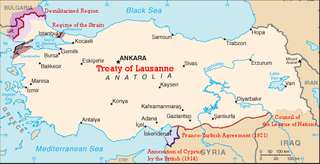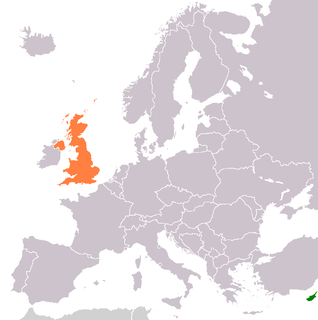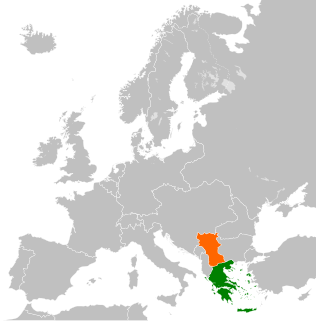Related Research Articles

Cyprus, officially called the Republic of Cyprus, is an island country in the eastern Mediterranean Sea. It is the third largest and third most populous island in the Mediterranean and is located south of Turkey; west of Syria; northwest of the Gaza Strip, Israel, and Lebanon; north of Egypt; and southeast of Greece. The country's capital and largest city is Nicosia.

The Treaty of Lausanne was a peace treaty negotiated during the Lausanne Conference of 1922–23 and signed in the Palais de Rumine, Lausanne, Switzerland, on 24 July 1923. The treaty officially settled the conflict that had originally existed between the Ottoman Empire and the Allied French Republic, British Empire, Kingdom of Italy, Empire of Japan, Kingdom of Greece, and the Kingdom of Romania since the onset of World War I. The original text of the treaty is in French. It was the result of a second attempt at peace after the failed and unratified Treaty of Sèvres, which aimed to divide Ottoman lands. The earlier treaty had been signed in 1920, but later rejected by the Turkish national movement who fought against its terms. As a result of Greco-Turkish War, İzmir was retrieved and Armistice of Mudanya was signed in October 1922. It provided for the Greek-Turkish population exchange and allowed unrestricted civilian passage through the Turkish Straits.
The Cyprus dispute, also known as the Cyprus conflict, Cyprus issue, Cyprus question or Cyprus problem, is an ongoing dispute between Greek Cypriots and Turkish Cypriots. Initially, with the occupation of the island by the British Empire from the Ottoman Empire in 1878 and subsequent annexation in 1914, the "Cyprus dispute" was a conflict between the Turkish and Greek islanders.

Enosis is the movement of various Greek communities that live outside Greece for incorporation of the regions that they inhabit into the Greek state. The idea is related to the Megali Idea, an irredentist concept of a Greek state that dominated Greek politics following the creation of modern Greece in 1830. The Megali Idea called for the annexation of all ethnic Greek lands, parts of which had participated in the Greek War of Independence in the 1820s but were unsuccessful and so remained under foreign rule.

This article is about the history of Cyprus from 1878 to the present.

The Turkish invasion of Cyprus was launched on 20 July 1974, following the Cypriot coup d'état on 15 July 1974.

The Turkish Cypriot enclaves were inhabited by Turkish Cypriots between the intercommunal violence of 1963–64 and the 1974 Turkish invasion of Cyprus.

The London and Zürich Agreements for the constitution of Cyprus started with an agreement on the 19 February 1959 in Lancaster House, London, between Turkey, Greece, the United Kingdom and Cypriot community leaders. On that basis, a constitution was drafted and agreed together with two prior Treaties of Alliance and Guarantee in Zürich on 11 February 1959.
Several distinct periods of Cypriot intercommunal violence involving the two main ethnic communities, Greek Cypriots and Turkish Cypriots, marked mid-20th century Cyprus. These included the Cyprus Emergency of 1955–59 during British rule, the post-independence Cyprus crisis of 1963–64, and the Cyprus crisis of 1967. Hostilities culminated in the 1974 de facto division of the island along the Green Line following the Turkish invasion of Cyprus. The region has been relatively peaceful since then, but the Cyprus dispute has continued, with various attempts to solve it diplomatically having been generally unsuccessful.
The Balkan Pact of 1953, officially known as the Agreement of Friendship and Cooperation, was a treaty signed by Greece, Turkey and Yugoslavia on 28 February 1953. It was signed in Ankara. The treaty was to act as a deterrence against Soviet expansion in the Balkans and provided for the eventual creation of a joint military staff for the three countries. At the time the pact was created, Turkey and Greece were members of the North Atlantic Treaty Organisation (NATO), while Yugoslavia was a non-aligned communist state. The Balkan Pact allowed Yugoslavia to associate itself with NATO indirectly. In October 1954 Israel showed some interest in joining the alliance in expectation that Yugoslavia may help in the development of the Egypt–Israel relations.

Greek–British relations are foreign relations between Greece and the United Kingdom. Greece and the United Kingdom maintain excellent and cordial bilateral relations and consider each other an ally with the Greek Prime Minister, Kyriakos Mitsotakis, paying an official visit to London in 2021. Greece and the United Kingdom are both members of the United Nations, NATO and the Council of Europe. The United Kingdom is also viewed very favorably in Greece. According to a global opinion poll, 77% of Greeks view the United Kingdom favourably, while only 10% don't. The British have a very positive opinion of Greece as well. 65% of the British view Greece positively, while only 5% view it negatively.
The Treaty of Guarantee is a treaty between Cyprus, Greece, Turkey, and the United Kingdom that was promulgated in 1960.

Cypriot–British relations are foreign relations between Cyprus and the United Kingdom. Cyprus gained its independence from the United Kingdom in 1960, after 82 years of British control. The two countries now enjoy warm relations, however the continuing British sovereignty of the Akrotiri and Dhekelia Sovereign Base Areas has continued to divide Cypriots. The two countries share membership of the United Nations and the Commonwealth of Nations.

Cypriot–Russian relations refers to bilateral foreign relations between the Republic of Cyprus and the Russian Federation. The Soviet Union established diplomatic relations with the newly independent Republic of Cyprus on 18 August 1960. Cooperation between both countries has increased since the 1990s because of the end of the Soviet Union. Cyprus has an embassy in Moscow, and Russia has an embassy in Nicosia.

The relations between Turkey and the United Kingdom have a long history. The countries have been at war several times, such as within the First World War. They have also been allied several times, such as in the Crimean War. Both countries currently maintain relations via the British Embassy in Ankara and the Turkish Embassy in London.
The Akritas plan, was an inside document of the Greek Cypriot secret organisation of EOK that was authored in 1963 and was revealed to the public in 1966. It entailed the weakening the Turkish Cypriots in the government of Cyprus and then uniting (enosis) Cyprus with Greece. According to Turkish Cypriots, the plan was a "blueprint to genocide", but Greek Cypriots claimed that it was a defensive plan.

United Nations Security Council resolution 774, adopted unanimously on 26 August 1992, after reaffirming all previous resolutions on Cyprus, the Council noted that while some progress had been made in negotiations between the two communities on Cyprus, there had still been some difficulties in fully implementing Resolution 750 (1992).

The Greek–Serbian Alliance of 1913 was signed at Thessaloniki on 1 June 1913, in the aftermath of the First Balkan War, when both countries wanted to preserve their gains in Macedonia from Bulgarian expansionism. The treaty formed the cornerstone of Greek–Serbian relations for a decade, remaining in force through World War I until 1924.

British Cyprus was the island of Cyprus under the dominion of the British Empire, administered sequentially from 1878 to 1914 as a British protectorate, a unilaterally annexed military occupation from 1914 to 1925 and from 1925 to 1960 as a Crown colony. Following the London and Zürich Agreements of 19 February 1959 Cyprus became an independent republic on 16 August 1960.

Operation Snowgoose is the Canadian involvement in the UN peacekeeping mission in Cyprus (UNFICYP). This operation was established in 1964 alongside the UN peacekeeping mission in Cyprus with the goal of reducing tensions between the Greek Cypriot and Turkish Cypriot populations on the island. Canada's participation with UNFICYP was named "Snowgoose" in 1974, and has one of the longest durations of any Canadian peacekeeping operation. Over 33,000 Canadians have served since the beginning of this mission, but currently only one Canadian participates in the operation per year.
References
- 1 2 3 4 Hannay, Lord (2005). Cyprus: The Search for a Solution. I.B.Tauris. pp. 31–32. ISBN 1850436657 . Retrieved 13 August 2012.
- ↑ Ker-Lindsay, James (2011). The Cyprus Problem. Oxford: Oxford University Press. p. 28. ISBN 978-0199831357 . Retrieved 13 August 2012.